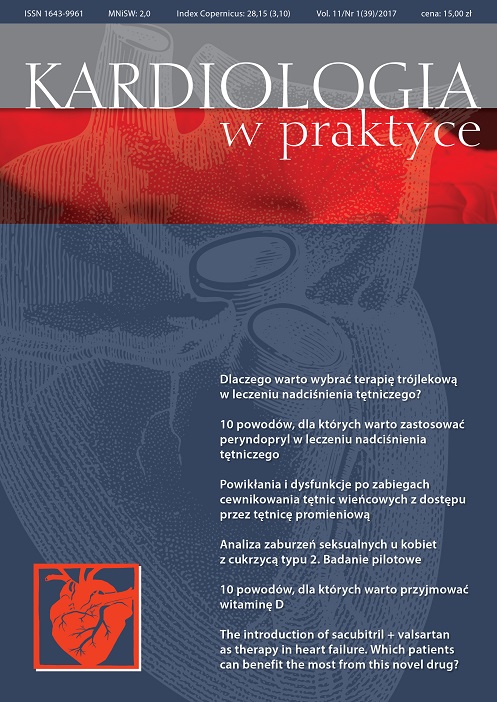10 reasons, why it is worth to take vitamin D Review article
Main Article Content
Abstract
Vitamin D is a group of fat-soluble vitamins. The best known function of vitamin D is influence on intestinal calcium and phosphorus absorption. Together with PTH and calcitonin vitamin D regulates bone metabolism and maintains constant serum calcium concentration. Vitamin D was discovered more than 100 years ago, however only in 30s of the last century rickets was associated with its deficiency. Research from the second half of the 20th century have shown that vitamin D is actually a prohormone, which only after connection to specific receptor (VDR) and transformation, manifests its activity. In recent years there has been a huge increase in interest in pleiotropic action of vitamin D. The important role of vitamin D deficiency as a risk factor, not only of rickets and osteomalacia, but also of cardiovascular diseases, autoimmunology, infections, cancer, diabetes and depression have been suggested in numerous studies. In the light of these studies vitamin D supplementation seems reasonable, especially in the autumn-winter period.
Downloads
Article Details

This work is licensed under a Creative Commons Attribution-NonCommercial 4.0 International License.
Copyright: © Medical Education sp. z o.o. This is an Open Access article distributed under the terms of the Attribution-NonCommercial 4.0 International (CC BY-NC 4.0). License (https://creativecommons.org/licenses/by-nc/4.0/), allowing third parties to copy and redistribute the material in any medium or format and to remix, transform, and build upon the material, provided the original work is properly cited and states its license.
Address reprint requests to: Medical Education, Marcin Kuźma (marcin.kuzma@mededu.pl)
References
2. Płudowski P., Konstantynowicz J., Jaworski M. et al.: Ocena stanu zaopatrzenia w witaminę D w populacji osób dorosłych w Polsce. Standardy medyczne/ Pediatria 2014; 11: 609-617.
3. Płudowski P., Grant W.B., Bhattoa H.P. et al.: Vitamin status in Central Europe. Int. J. Endocrinol. 2014. http://doi.org/10.1135/2014/589587.
4. Płudowski P., Karczmarewicz E., Chlebna-Sokół D. et al.: Witamina D: Rekomendacje dawkowania w populacji osób zdrowych oraz w grupach ryzyka deficytów – wytyczne dla Europy Środkowej 2013 r. Standardy medyczne/Pediatria 2013; 10: 573-578.
5. Lips P.: Vitamin D physiology. Prog. Biophys. Mol. Biol. 2006; 92: 4-8.
6. Lai Y.-H., Fang T.-C.: The pleiotropic effect of vitamin D. ISRN Nephrology 2013. http:/doi.org/10.5402/2013/898125.
7. Bikle D.D.: Vitamin D metabolism, mechanism of action, and clinical applications. Chem. Biol. 2014; 21(3): 319-329. http://doi.org/10.1016/j.chembiol.2013.12.016.
8. Wacker M., Holick M.: Vitamin D-effects on skeletal and extraskeletal health and the need for supplementation. Nutrients 2013; 5: 111-148. http://doi.org/10.3390/nu5010111.
9. Baeke F.,Takishi T., Korf H. et al.: Vitamin D: modulator of the immune system. Curr. Opin. Pharmacol. 2010; 10: 482-496.
10. Van Belle T.L., Gysemans C., Mathieu C.: Vitamin D in autoimmune, infections and allergic diseases: A vital player? Best Pract. Res. Clin. Endocrinol. Metab. 2011; 25: 617-632.
11. Bergman P., Lindh A.U., Björkhem-Bergman L., Lindh J.D.: Vitamin D and respiratory tract infections: A systematic review and meta-analysis of randomized controlled trials. PloS one 2013; 8(6): e65835. http://doi.org/10.1371/journal.pone 0065835.
12. Pelajo C.F., Lopez-Benitez J.M., Miller L.C.: Vitamin D and autoimmune rheumatic disorders. Autoimmun. Rev. 2010; 9: 507-510.
13. Pierrot-Deseilligny C., Rivaud-Pechoux S., Clerson P. et al.: Relationship between 25-OH-D serum level and relapse rate in multiple sclerosis patients before and after vitamin D supplementation. Ther. Adv. Neurol. Disord. 2012; 5: 187-198.
14. Sǿrensen I.M., Joner G., Jenum P.A. et al.: Maternal serum levels of 25-hydroxy-vitamin D during pregnancy and risk of type 1 diabetes in the offspring. Diabetes 2012; 61: 175-178.
15. Autier P., Boniol M., Pizot C., Mullie P.: Vitamin D status and ill health: a systematic review. Lancet Diabetes Endocrinol. 2014; 2(1): 76-89.
16. Norman P.E., Powell J.T.: Vitamin D and cardiovascular disease. Circulation research 2014; 114: 379-393.
17. Kosecik M., Ertas T.: Dilated cardiomyopathy due to nutritional vitamin deficiency rickets. Pediatr. Int. 2007; 49: 397-399.
18. Nimiphong H., Holick M.F.: Vitamin D, neurocognitive functioning and immunocompetence. Curr. Opin. Clin. Nutr. Metab. Care 2010; 14: 7-14.
19. Schlögl M., Holick M.F.: Vitamin D and neurocognitive function. Clin. Interv. Aging 2014; 9: 559-568.
20. Chowdhury R., Kunutsor S., Vitezova A. et al.: Vitamin D and risk of cause specific death: systematic review and meta-analysis of observational cohort and randomised intervention studies. BMJ 2014. http://doi.org/101136/bmj.g1903.
21. Amrein K., Schnedl C., Holl A. et al.: Effect of high-dose vitamin D3 on hospital length of stay in critically ill patients with vitamin D deficiency. The VITdAL-ICU Randomized clinical trial. JAMA 2014; 312: 1520-1530.

